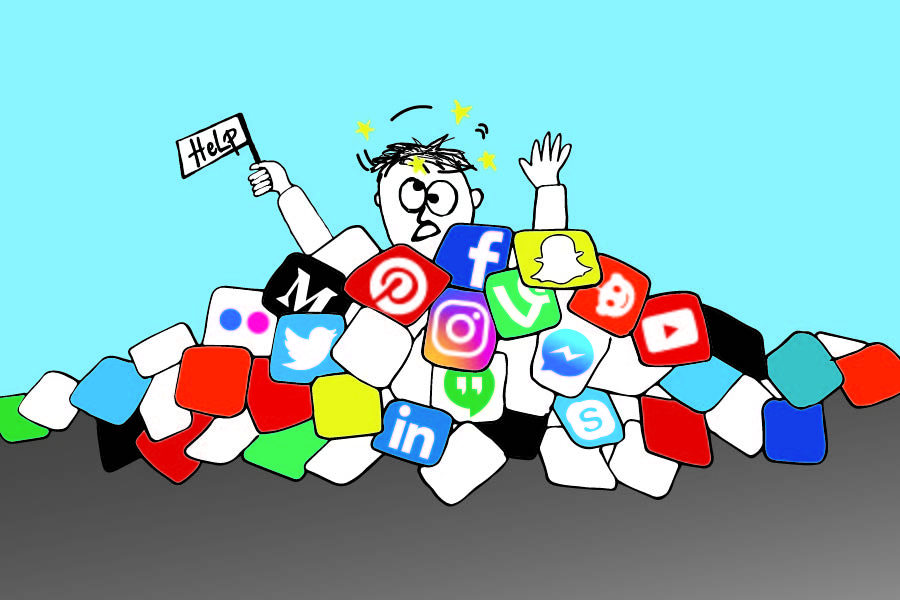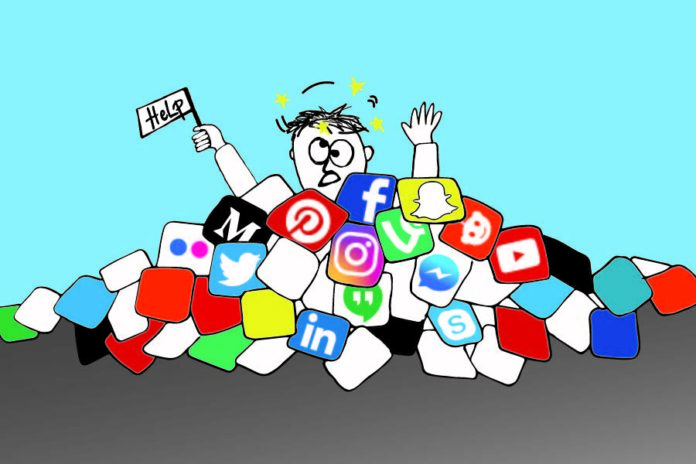
Polished social media posts can fuel feelings of inadequacy and loneliness
 We constantly walk around campus with our eyes glued to our smartphones. Some people like taking notes on their computers, which provides easy internet access in class. The blood of social media sites runs through our devices. We’re always scoping out what’s new on Instagram, Facebook and any number of other social media platforms. We’re much more interested in other people’s lives than our own. Instead of focusing on ourselves, we spend our time following everyone else’s daily lives. Allowing our attention to be focused on others takes away from the attention we should be giving ourselves.
We constantly walk around campus with our eyes glued to our smartphones. Some people like taking notes on their computers, which provides easy internet access in class. The blood of social media sites runs through our devices. We’re always scoping out what’s new on Instagram, Facebook and any number of other social media platforms. We’re much more interested in other people’s lives than our own. Instead of focusing on ourselves, we spend our time following everyone else’s daily lives. Allowing our attention to be focused on others takes away from the attention we should be giving ourselves.
The amount of time spent on social media can play a role in damaging our mental health. Users log in to view what’s happening in the lives of the people they follow. It’s human nature to see someone’s status and compare their life to our own. There are several reasons why this is a bad habit to pick up. Users choose what they put on their own social media profiles, and what they choose to show is not their whole personal story. The majority of what they choose to post will, of course, display positivity and make it seem like their lives are perfect. However, there is more to someone than what’s on their Facebook timeline. Users need to remember to not think of one person as better than themselves. Social media is basically a cover page, and users shouldn’t assume that what a person decides to share publicly — often a polished version of themselves — is an accurate depiction of their life. There’s more to the people on the other side of the screen.
An article in Time discussed a recent survey of almost 1,500 teenagers and young adults who were asked to score how the social media platforms they use impact wellbeing-related issues. Some of these issues included anxiety, depression, body image and the fear of missing out. Instagram was ranked at the bottom of the five most popular social media sites for having the most negative effects on a person’s mental health.
“Social media posts can also set unrealistic expectations and create feelings of inadequacy and low self-esteem,” Amanda MacMillan reported in the article.
Instagram is a platform strictly for posting pictures that users wish to share with their followers. A majority of these posts are “selfies,” and with the number of filters and edits that can be applied, it’s easy for someone to manipulate their self-image to “perfection.” Scrolling through pictures of people who appear put together can lead users to jump right into forming comparisons. Being solely a feed of photos, Instagram provides the most space for people to display their most attractive features and appealing adventures. These refined images can affect anyone who opens their social media apps and can consequently lower self-esteem.
Matters are made worse when the viewer sees the amount of attention and “likes” the post receives. Jealousy can also result when friends on social media appear more popular and attractive, which can trigger feelings of loneliness. On Instagram, users pay particular attention to the appearance of their profiles — aiming to include only eye-catching, high-quality photos.
Because social media platforms often exclusively display the good side of life, users shouldn’t allow what people post to impact their emotional wellbeing. Reconditioning ourselves to avoid getting intensely drawn into status updates and profiles pictures will allow us to maintain our mental health. Social media does not reveal everything about a person, so the content that’s shared shouldn’t make people think less about who they are and what they do possess.
Written by: Jolena Pacheco — mspacheco@ucdavis.edu
Disclaimer: The views and opinions expressed by individual columnists belong to the columnists alone and do not necessarily indicate the views and opinions held by The California Aggie.





